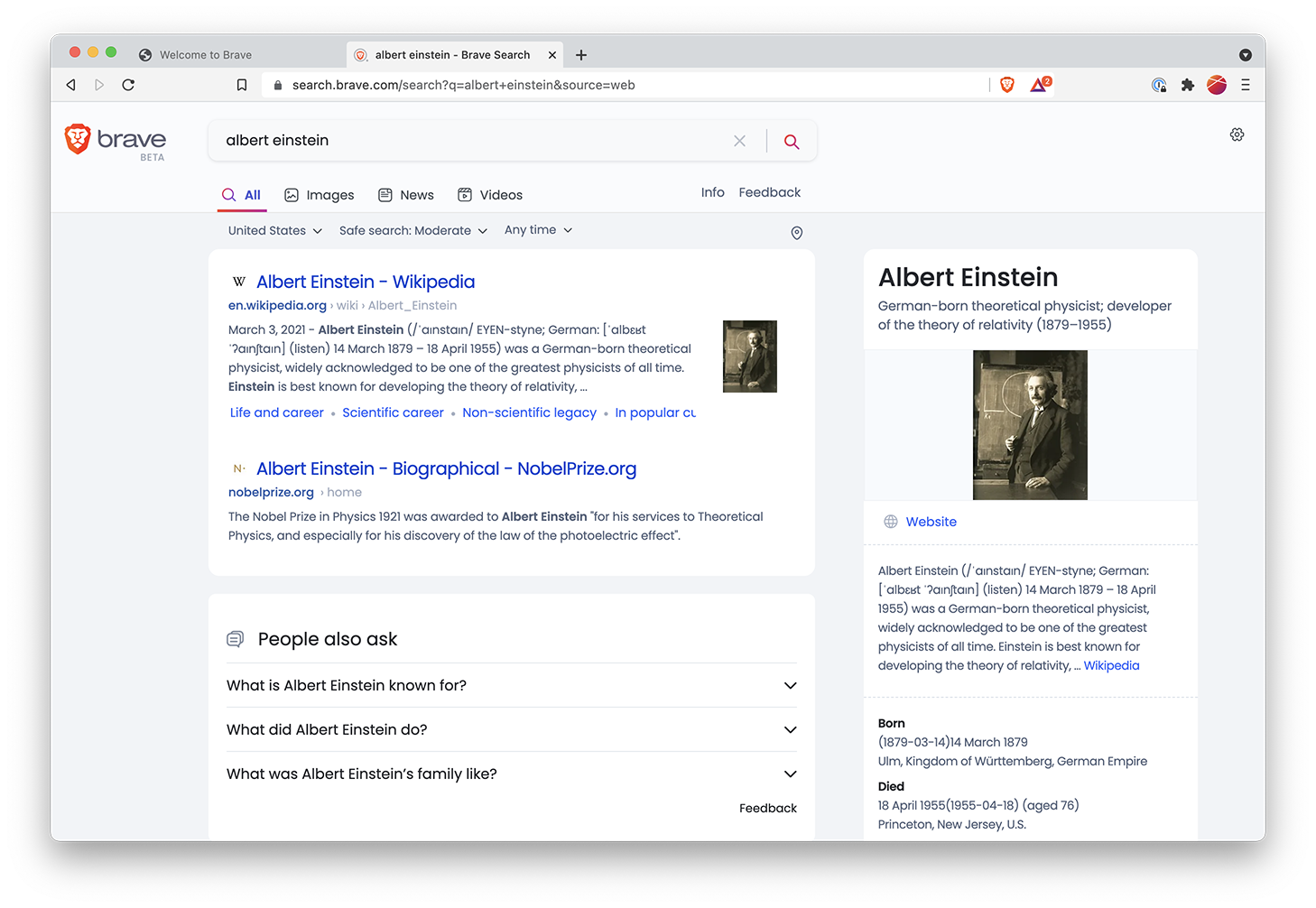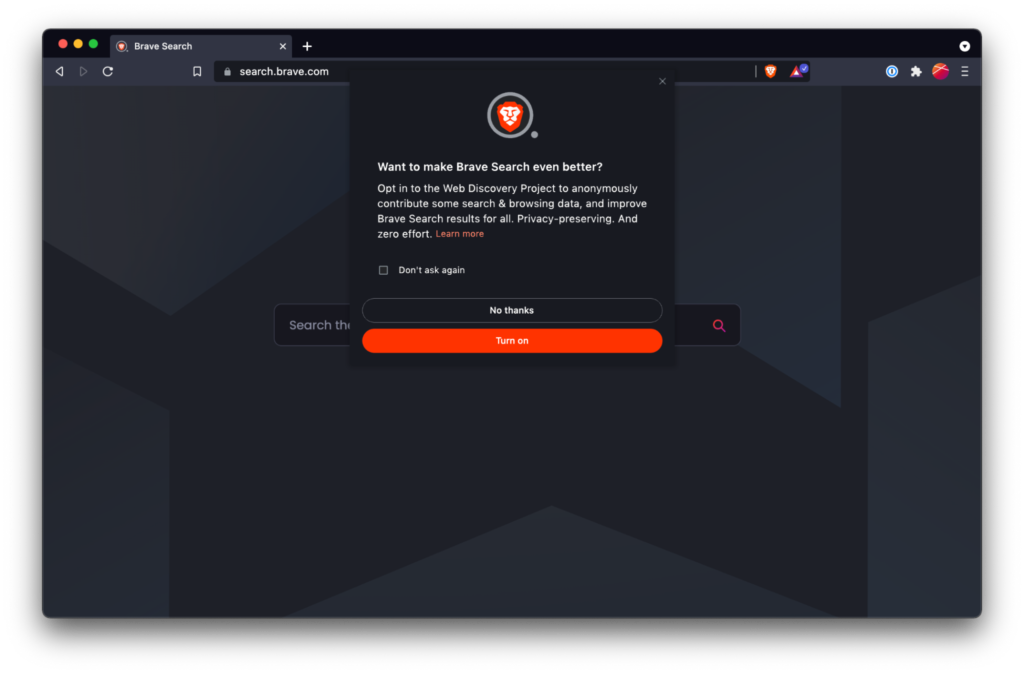Brave also debuts its opt-in Web Discovery Project to anonymously crowdsource improvements to Brave Search
Starting today, new Brave users will have the search functionality in the Brave browser powered by Brave Search, giving them the privacy and independence of a search/browser alternative to Big Tech. Brave Search is built on top of an independent index, and doesn’t track users, their searches, or their clicks. Privacy-preserving Brave Search now replaces Google as the default search engine used in the address bar for new Brave users in the United States, Canada, and the United Kingdom; Brave Search as default also replaces Qwant in France, and DuckDuckGo in Germany, with more geographies to be added in the next several months. Existing Brave users will keep their chosen search engine default, and can set Brave Search as the default search engine in Brave or most other major browsers.
Today’s Brave desktop browser update (version 1.31), as well as the Brave Android app (version 1.31) and the Brave iOS app (version 1.32) all automatically offer Brave Search as the default for new users in these five countries, with fully localized versions in non-English geographies. Brave users can easily choose a different search option if they prefer by managing their search engine settings. Brave Search is also available in any other browser at search.brave.com.
Brave Search is currently not displaying ads, but the free version of Brave Search will soon be ad-supported. Brave Search will also offer an ad-free Premium version in the near future.
“Brave Search has grown significantly since its release last June, with nearly 80 million queries per month. Our users are pleased with the comprehensive privacy solution that Brave Search provides against Big Tech by being integrated into our browser,” said Brendan Eich, CEO and co-founder of Brave. “As we know from experience in many browsers, the default setting is crucial for adoption, and Brave Search has reached the quality and critical mass needed to become our default search option, and to offer our users a seamless privacy-by-default online experience.”
Brave Search is also launching the Web Discovery Project (WDP), a privacy-preserving system for users to anonymously contribute data to improve Brave Search coverage and quality, and its independence and competitiveness against Big Tech alternatives. The WDP is a strictly opt-in feature and protects user privacy and anonymity by design, so that contributed data cannot be linked to individuals or their devices, and cannot be linked together for a user or set of users; this prevents deanonymization.
The WDP represents a fundamental shift in how a search index is built to serve relevant results for users. It is a major step forward from the typical server-side aggregation used by the industry. Big Tech search providers collect data from users without asking or notifying users, to continuously grow their indexes—the list of billions of web pages they draw from to deliver results—and to ensure results are relevant and never stale. This data can be, and often is, associated with users personally by an identifier or linkable records. Unlike those search providers, the Web Discovery Project is designed so that all data received is unlinkable, making it impossible to build profiles or sessions of Web Discovery Project contributors. This means there’s no data for Brave to sell to advertisers, or lose to theft or hacking, or hand over to government agencies, allowing us to keep promises through technology rather than slogans.
The system contributes anonymous search and browsing data made within the Brave browser from users who have opted in. This data helps build the Brave Search independent index, and ensures Brave Search shows results relevant to search queries. For a URL to be sent, it needs to be visited independently by a large number of people; this is achieved by using the novel STAR cryptographic protocol. The WDP’s privacy-preserving methodology discards search queries that are too long or suspicious looking. It also discards odd URLs (such as capability URLs), URLs of pages that the creator defined as non-indexable, and of course pages that are not public or that require any sort of authentication. The Web Discovery Project runs automatically while a user is browsing the web, so it requires no effort on the part of contributors. Users who have opted in but no longer wish to participate can opt out at any time.
For more technical details, an overview of the Web Discovery Project can be found on Brave’s GitHub repo.
Brave Search is part of the suite of privacy-preserving tools offered by Brave, as millions of users are turning to alternatives to big tech. Brave also offers Brave Ads, Brave News, a Firewall+VPN service, and the recently-released Brave Talk for unlimited, private video calls.
About Brave:
Brave Software’s fast, privacy-oriented browser, combined with its blockchain-based digital advertising platform, is reinventing the Web for users, publishers, and advertisers. Users get a private, speedier web experience with much longer battery life, publishers increase their revenue share, and advertisers achieve better conversion. Users can opt into privacy-respecting ads that reward them with the Basic Attention Token (BAT), a frequent flyer-like token they can redeem or use to tip or contribute to publishers and other content creators. The Brave solution is a win-win for everyone who has a stake in the open Web and who is weary of giving up privacy and revenue to the ad-tech intermediaries. Brave currently has over 38 million monthly active users and over 1.2 million Verified Publishers. Brave Software was co-founded by Brendan Eich, creator of JavaScript and co-founder of Mozilla (Firefox), and Brian Bondy, formerly of Khan Academy and Mozilla.
For more information, visit brave.com or follow the company on X (formerly Twitter) @brave.











